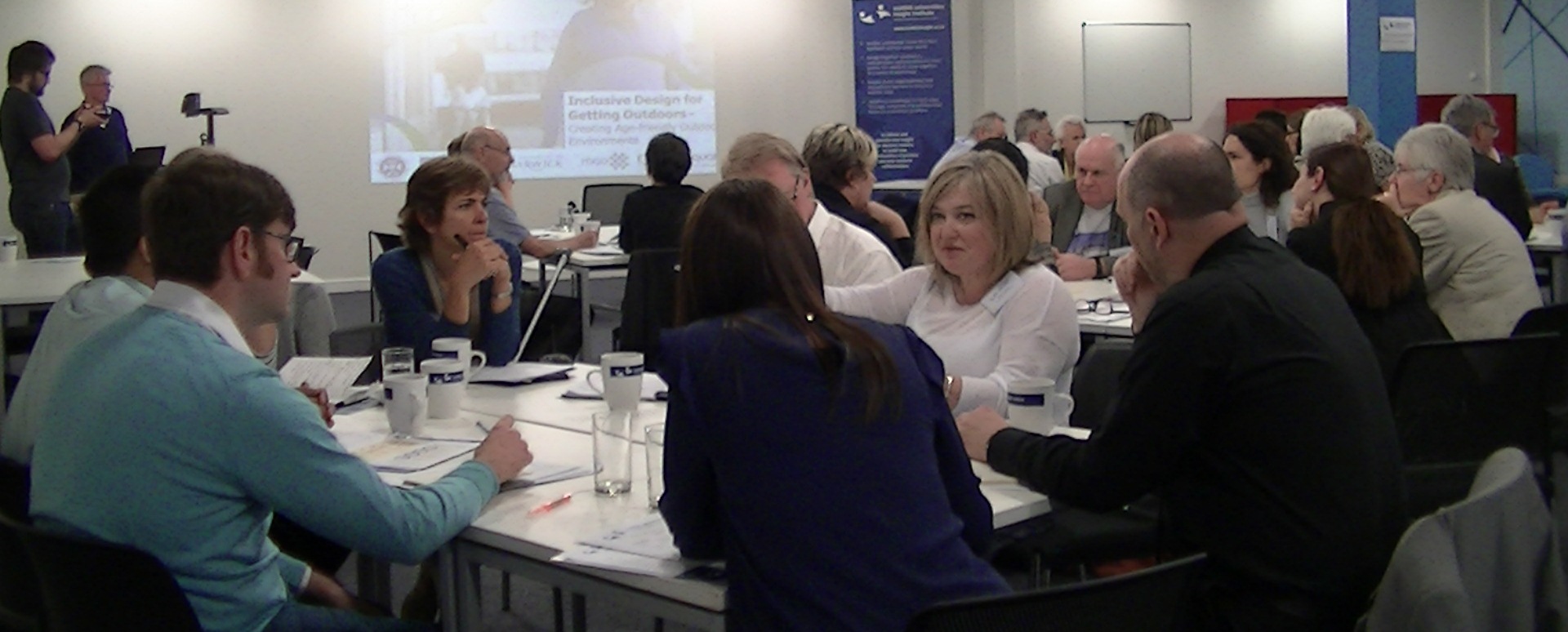MFN ii – the Virtual Neighbourhood

Focusing on the ‘virtual neighbourhood’, the second phase of Memory-Friendly Neighbourhoods was a means of directly addressing the knowledge gaps we had identified around digital exclusion and dementia in 2014. Beginning in early 2016, with the support of East Dunbartonshire Council, Age Scotland and the Life Changes Trust, we set about exploring how people living with dementia use and navigate online environments and what their needs and preferences might be for websites and applications.
In the first instance, we held an opening meeting of people involved in web design and content provision to find out what challenges they face in making their sites dementia-friendly. We also asked our delegates to tell us about any organisations, programmes and initiatives they were aware of in the area of widening digital participation for people with dementia.
Over the next six months, we set about talking to as many of the people who were involved in, or made use of, these services as possible. We surveyed 23 people online, engaged in a Twitter chat with 107 participants, met 19 groups across the Scottish central belt, and had in-depth follow up conversations with seven individuals to engage with internet users whose lives are affected by dementia.
We held our final event in January 2017, bringing around 30 delegates together to share and discuss what people had told us, critique a number of websites (including our own), share tips and techniques for making sites more user friendly for people with dementia, and prioritise potential future work streams. You can find out what we shared in our opening presentation and our reference sheet from this event.
The people we spoke to who are living with dementia and using internet-based technologies tend to do so to keep in contact with friends and family and for recording, reminding and reminiscing. But when it comes to technology that is less ‘consequence free’, like apps and websites that facilitate financial transactions (banking, buying groceries, booking travel etc.), many people do not use them to their full potential, often because they lack the confidence in their own skills to do so without “getting something wrong”.

There are important implications here for technology developers and their clients, given that many key services are moving away from face-to-face transactions towards online service provision. In our presentation (slides 43-54), we have identified 11 positive things that service providers can do to help close the digital exclusion gap, as well as exploring the potential benefit of tools and techniques such as microinteractions (slides 55-60) and onboarding (slides 61-65) to people living with dementia.
We are also making five recommendations for future activity by stakeholders to tackle digital exclusion; at our final event, delegates prioritised these recommendations in the order they appear below…
- Enable more people with dementia to get involved in design and usability testing for feeding back into existing accessibility guidelines.
- Investigate training options, such as a community-led approach, to build people’s confidence and skills.
- Create a knowledge base of ‘peer reviewed’ resources, i.e. sites and apps recommended by other people with dementia, and practical guides for using them.
- Widen the focus of activity to look at the dementia-friendly usability / application of new technology areas, such as smart-home devices and wearable/fitness devices.
- Create a framework of practical web developer resources for those building websites and apps.
In video interviews, project partners Julie Christie (East Dunbartonshire Council, now HammondCare) and Richard Baker (Age Scotland) have told us why they chose to get involved in Memory-Friendly Neighbourhoods and what they perceive the project’s benefits and achievements to be.
Sue Northrop (Dementia Friendly in East Lothian) has also told us that the digital work in particular “was great… really useful, not least because I am getting our website and Facebook etc. rejigged so perfect timing. I'm sharing the link with website workers here as I get the chance”.
View our website: https://memoryfriendly.org.uk/